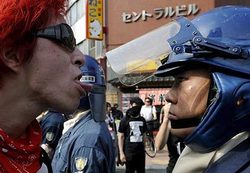Protesters train at camps before Japan G8 summit
Normally, I would turn and flee. But we were both playing roles in a training exercise for demonstrators preparing for Monday's G8 summit in Hokkaido in northern Japan, and my own face was covered by a menacing revolutionary scarf.
Thousands of protesters have marched, danced and drummed their way through the streets near a highly secured hotel on the remote Lake Toya where the leaders will meet.

For many people, the focus has already shifted from Gordon Brown's stance on climate change and the contents of Carla Bruni's wardrobe to the students, farmers, trade unionists and anarchists trying to disrupt proceedings.
Japan, where such protest training camps have never been set up before, is taking the threat very seriously: it has deployed 40,000 armed police across the country and is spending £142 million on security.
The police have arrested three demonstrators after angry scuffles, including the disc-jockey on a mobile protest float.
The protesters have been carefully planning their response in a rural camp in nearby Tobetsu.
The programme covers direct action workshops, protest tactic discussions, legal advisory training, puppet making, football tournaments and drumming sessions.
In the guise of a Western protester, The Telegraph infiltrated the camp, which adheres to a strict "no media" policy.
It was a 20-minute walk through green fields backed by mist-shrouded mountains and drizzly skies. But as the string of colourful tents came into view, a car could also be seen in the distance, manned by plain clothes police keeping a watchful eye on proceedings.
The camp was set in the grounds of a former school, where flourescent anti-G8 banners fluttered in the breeze and a large sign read: "Alternative village."
Inside a reception tent, two Japanese activists slouched on a sofa, handed out a list of rules and politely asked for a daily Y1,500 (£7) donation to help run the camp.
About three quarters of the protesters are Japanese from a variety of backgrounds, including trade unionists, farmers, activists, and the Japanese Communist party.
Many of them are students, but there were plenty of older Japanese citizens as well, including Hiroshi Tsuchira, 71, a retired airport worker.
“Life is difficult for people in Japan and I have never been to march this big before but it is important for people to hear our voice,” he said. “Our future will not be good if it lies in the hands of the G8 leaders.”
Other activists came from San Francisco, London and Nantes.
They included people from charities like Oxfam and more riotous protesters from a French anarcho-syndicalist commune.
"We are protesting against a structure of capitalism that has been created by the G8 summit," said Nakata-san, a political science student from Tokyo. "We want to create our own ideal system in this campsite community."
Despite its anarchic credentials, the campsite offers a perfect template of Japan's renowned organisational skills. Neat piles of placards, T-shirts and recycling bins line the entrance, while leaflets offer advice on protest etiquette.
Japanese bamboo flute music is as prominent as punk rock on the internal sound system, which also broadcasts sudden and surreal messages: "Will volunteers please help peel vegetables for dinner!" or "Rave party in the gym at 5pm!"
The gym is a vast space filled with piles of anti-G8 banners and brightly coloured protest "puppets" – including eight wooden creations on sticks emblazoned with skulls on one side and the faces of G8 leaders on the other.
And there are many meetings. After a long discussion about colour-coded washing-up bowls and whether sheets should be used with futons, the cultural differences suddenly came to light.
"Is there nothing else to talk about?" muttered Sarah, a straight-talking activist who spent two months travelling overland to Japan from London. "I'm stunned."
Beneath the veneer of domesticity, serious training sessions are under way for the 1,000 protesters at three camps near Lake Toya.
One teaches how to avoid arrest. "It was hands on, direct and practical," said James, a 19-year-old Cambridge undergraduate. "It's useful for people who want to go to these protests and make an impact without getting arrested."
From intricate diagrams of where to stand in a crowd to stunts like dressing up as clowns, the discussions are painstakingly detailed.
For protesters who need to sleep, there are tents or, for an additional fee, three neatly organised rooms, equipped with futons and blankets.
And for those too hungry to continue training on behalf of the world's poor, there are delicious vegan meals of curry, risotto, seaweed salad and fresh fruit prepared by a "food collective" that also works around the clock to make fresh hemp bread from cannabis seeds.
Late arrivals were disappointed to learn that they had missed the last of the direct action workshops laid on over previous days. They were masterminded by Lisa Fithian, an American activist - and so fearful are the Japanese authorities over the risk of disruption to the summit that she was reportedly only allowed into the country on condition that she left before the summit had even begun.
Source: http://www.telegraph.co.uk/news/worldnews/asia/japan/2252071/Protesters-train-at-camps-before-Japan-G8-summit.html



